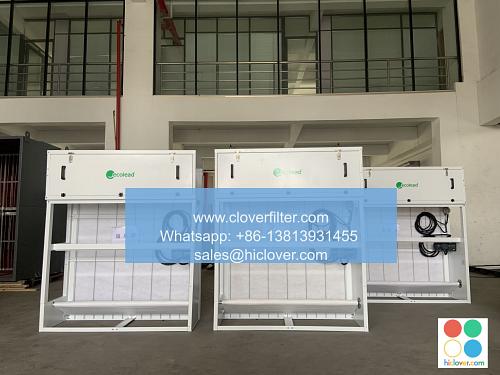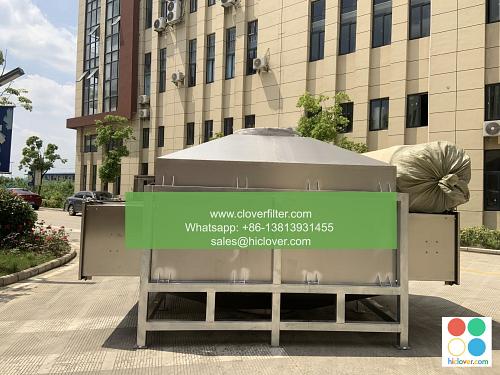Offshore Oil Platforms in Newfoundland: The Impact of Automatic Roll Air Filters on the Environment

Newfoundland, known for its rich oil reserves, has been a hub for offshore oil exploration and production. The province’s offshore oil platforms have been in operation for decades, with many companies investing heavily in the industry. However, the environmental impact of these platforms has been a topic of concern for many years. One aspect that has gained attention in recent years is the use of automatic roll air filters on these platforms. In this article, we will explore the impact of these filters on the environment and the measures being taken to mitigate any negative effects.
The offshore oil platforms in Newfoundland are equipped with various systems to ensure efficient and safe operation. One of these systems is the air filtration system, which is responsible for removing pollutants and contaminants from the air. Automatic roll air filters are a type of air filter used on these platforms, designed to automatically roll out a new filter media as the old one becomes dirty. This system is efficient and requires minimal maintenance, making it an attractive option for offshore oil platforms.
However, the use of automatic roll air filters has raised concerns about their environmental impact. The filters themselves are made of materials that can harm the environment if not disposed of properly. Additionally, the discarded filter media can contain pollutants and contaminants that can affect marine life if released into the ocean. The filters also require a significant amount of energy to operate, which can contribute to greenhouse gas emissions and climate change.
Despite these concerns, the use of automatic roll air filters on offshore oil platforms in Newfoundland is regulated by strict environmental guidelines. The Canada-Newfoundland and Labrador Offshore Petroleum Board (C-NLOPB) is responsible for overseeing the industry and ensuring that operators comply with environmental regulations. The C-NLOPB requires operators to implement measures to minimize the environmental impact of their operations, including the use of air filtration systems.
In recent years, there has been a shift towards more environmentally friendly air filtration systems. Some operators have begun to use alternative filter media that is more biodegradable and less harmful to the environment. Others have implemented recycling programs for used filter media, reducing the amount of waste generated by the platforms. Additionally, operators are exploring ways to reduce energy consumption and greenhouse gas emissions, such as using renewable energy sources and increasing energy efficiency.
The impact of automatic roll air filters on the environment is not limited to the offshore oil platforms themselves. The filters can also affect the surrounding marine ecosystem. The discarded filter media can contain pollutants and contaminants that can harm marine life, and the energy consumption required to operate the filters can contribute to climate change. However, the offshore oil industry in Newfoundland is also contributing to the local economy and providing employment opportunities for many people.
In conclusion, the use of automatic roll air filters on offshore oil platforms in Newfoundland has both positive and negative impacts on the environment. While the filters are efficient and require minimal maintenance, they also have the potential to harm the environment if not disposed of properly. However, with strict environmental guidelines in place and a shift towards more environmentally friendly air filtration systems, the negative impacts can be mitigated. It is essential for operators to continue to explore ways to reduce their environmental footprint and for regulatory bodies to ensure that environmental guidelines are being followed.
FAQs
Q: What are automatic roll air filters, and how do they work?
A: Automatic roll air filters are a type of air filter used on offshore oil platforms to remove pollutants and contaminants from the air. They are designed to automatically roll out a new filter media as the old one becomes dirty, requiring minimal maintenance.
Q: What are the environmental concerns associated with automatic roll air filters?
A: The environmental concerns associated with automatic roll air filters include the potential for harm to the environment if not disposed of properly, energy consumption, and contribution to greenhouse gas emissions and climate change.
Q: What measures are being taken to mitigate the negative environmental impacts of automatic roll air filters?
A: Measures being taken to mitigate the negative environmental impacts of automatic roll air filters include the use of alternative filter media, recycling programs for used filter media, and efforts to reduce energy consumption and greenhouse gas emissions.
Q: Who regulates the use of automatic roll air filters on offshore oil platforms in Newfoundland?
A: The Canada-Newfoundland and Labrador Offshore Petroleum Board (C-NLOPB) regulates the use of automatic roll air filters on offshore oil platforms in Newfoundland, ensuring that operators comply with environmental guidelines and regulations.


